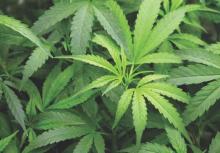The risk of developing first-episode psychosis is about three times higher for users of high-potency cannabis than it is for those who never use cannabis, findings published Feb. 18 in the Lancet show.
Dr. Marta Di Forti of King’s College London led a case-control study of 410 patients with a first- psychotic episode and 370 population controls. The patients, aged 16-65, were recruited from inpatient units in south London. Patients who met the criteria for organic psychosis were excluded. (Lancet 2015 Feb. 18 [http://dx.doi.org/10.1016/S2215-0366(14)00117-5]).
She and her associates found that the risk of psychosis was three times greater among people who had ever consumed high-tetrahydrocannabinol (THC), or “skunk-like” cannabis (adjusted odds ratio 2.92; 95% confidence interval 1.52–3.45; P = .001), compared to that of never-users.
Daily users of high-potency cannabis (THC of about 15%) saw an even higher risk of psychotic disorders compared to that of nonusers (adjusted OR 5.4; 95% CI 2.81-11.31; P = .002), suggesting that potency is a risk factor along with frequency of use. Dr. Di Forti and colleagues found the population-attributable fraction of first-episode psychosis for high-potency cannabis was 24% (95% CI 17-31) in the study area, possibly because of the high prevalence of high-potency cannabis use in that region of London.
Of the 410 patients with psychosis, more than half reported using high-potency cannabis, and 25% of them used it daily. Subjects who reported using low-THC or hash-like cannabis occasionally, weekly, or even daily saw no increased likelihood of psychotic disorders compared with those who never used cannabis.
Dr. Di Forti and her colleagues said they noted differences in the chemical makeup of hash-like and skunk-like cannabis that could help explain the findings. Studies have shown psychotic symptoms to be dose-dependent in people injected with THC, while another cannabis component, cannabidiol, is suspected to have antipsychotic properties or otherwise mitigate the effects of THC. Cannabidiol is barely present in skunk-like cannabis, while high in hash-like cannabis, the researchers noted.
They described as a limitation of their study their inability to collect precise information on the number of grams smoked or otherwise consumed. However, the findings “show the importance of raising public awareness of the risk associated with use of high-potency cannabis, especially when such varieties of cannabis are becoming more available.”
The study received funding from several sources, including the UK National Institute of Health Research. One of Dr. Di Forti’s co-authors, Robin M. Murray, reported having received honoraria from Otsuka, Lundbeck, and Janssen.


